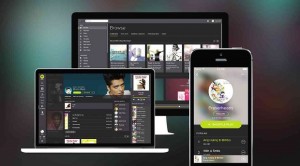
SPOTIFY users can stream music for free via its app downloadable on desktops, tablets and smartphones.
Original Pilipino music (OPM) can now be heard not only by Filipinos but also by music lovers in 55 other countries, as digital music streaming service Spotify expands into the Philippines.
Spotify—which claims it is “the biggest and most successful music streaming service of its kind globally”—was made available in the country starting Tuesday, amid high hopes that Filipinos would soon quit illegal downloads and instead turn to free, on-demand streaming services.
Spotify director for Asia Sunita Kaur tells reporters that the Philippines is their fifth Asian market, following last year’s launches in Hong Kong, Malaysia, Singapore and Taiwan.
The Philippines is the next big market for Spotify, Kaur says, stressing that “music is in Filipinos’ DNA.”
Users in the country will also be the first to enjoy the Spotify’s new, redesigned look—a slick, black interface.
Since Spotify can also be shared on social networking sites such as Facebook and Twitter as well as other online platforms like blogs and
e-mails, social media-savvy Filipinos who also love music would kill two birds with one stone.
Via the Spotify app that can be downloaded onto desktops, tablets and mobile devices, up to 30 million songs could be streamed for free, including OPM, Kaur says.
OPM will be made available not only in the Philippines but also in Spotify’s other foreign markets, she says. “We’re taking OPM to the rest of the world.”
Kaur adds it took Spotify some time to license the songs to be made available in the Philippines, in order to ensure that they will stream music legally.
“For every dollar we make, 70 percent we remit to the music industry,” she says.
The executive points out that piracy is a huge deterrent to the local music industry, as 95 percent of Filipinos download music illegally mostly from torrent sites. Each year, P3 billion is being lost to music piracy, affecting 83 percent of the records sold in the country, she adds.
Globally, half a billion people listen to music illegally, slashing recording industry revenues by 52 percent worldwide, Kaur notes.
But Spotify is hopeful that Filipino music lovers would eventually shift from illegal downloads to music streaming. “Our service is free and quicker than downloads, because the songs are cached in the cloud,” Kaur says.
Online streaming via Spotify is free because it is supported by ads, but for users who want to listen to music offline and without advertisements popping out, a premium service can be availed at P129 a month.
Starting April 13, telco provider Globe Telecom Inc. will have its GoSurf promos come with free Spotify.
Globe Telecom chief operating advisor Peter Bithos says their partnership with Spotify would help increase the number of its mobile data subscribers, which currently stands at over 10 million.
“During the last six months, we doubled our mobile data user base. We would love to double it again in the next six months … We hope our partnership with Spotify will give us the opportunity to double it again,” Bithos says.
Citing global research company TNS’s 2013 Mobile Life study, Globe says 12 percent of Filipinos spend their time online listening to music and watching videos, with 71 percent and 3 percent of them preferring to use mobile phones and tablets, respectively. Also, 24 percent of Internet users in the country stream music on the web, the study showed.
Spotify was launched in Sweden in 2008, and has since expanded to 56 countries, including the Philippines. The music streaming service now has over 24 million active users, of which more than 6 million are paying subscribers. To date, it has already paid about $1 billion in revenues to music rights holders across the world.